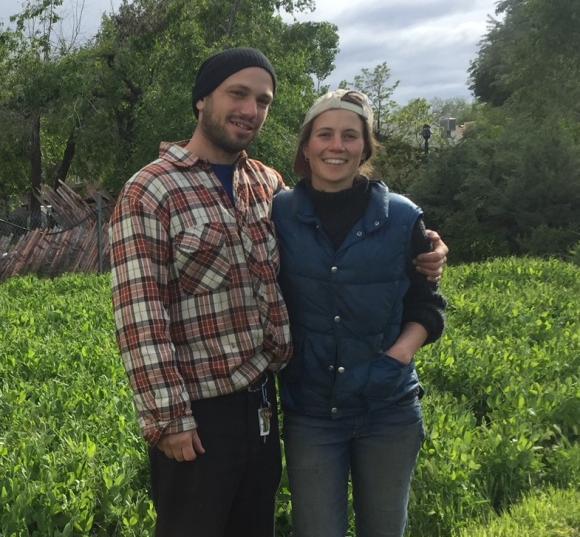
MEET BIOCHAR PRACTITIONER
Zach Hartlyn
Salt Lake City Backyard Urban Gardens (BUG) Farms
Q What is the scale and scope of your urban farming operation?
A My partner, Kristen, and I purchased BUG Farms from some friends 3 years ago. We farm just under an acre of land distributed across eight, small backyard plots in our neighborhood in Salt Lake City. During our 22-week Community Supported Agriculture (CSA) season, we provide an average of 90 weekly vegetable shares to our members and plot-owners. Along with Kristen and I, we have several workers and volunteers each season. Over the last 3 seasons, we have been transitioning our practices toward no-till and away from reliance on deep tillage.
Q What is the soil like? Is there a lot of variability in the neighborhood? What are your top concerns about soil?
A There are some soil differences. Most areas are clay, one area has a nicer loamy soil. We also have fairly high soil pH (7.4-7.8) so we focus a lot on cover cropping and avoid salty high pH manures. We are most worried about drought so we want to build soil carbon to help retain water.
Q What made you decide to try biochar in your operation?
A Both Kristen and I studied biochar in school, so we knew about Terra Preta and how biochar sequesters carbon in the soil. Back when we lived in Vermont, we knew people who had experimented with biochar. We heard GO Biochar's John Webster on a local radio program and contacted him. He was very helpful and gave us the information we needed to get started. This was our first year using biochar. We charged it up with humates, compost, and azomite, and applied about 5 gallons for every 30 square feet in one of our worst plots with heavy clay soil.
Q What kind results did you see? Will you continue to use biochar?
A It’s just the first year, and it was not a heavy application but I will say that the plot where we applied it was terrible last year and this year it was great. Of course, we made other changes, too, because you never just change one thing when you're farming but I think it really helped. We are definitely going to continue with biochar and use it in all of our plots next year. It is the right thing to do. We would like to incorporate better testing and diagnostic tools into our soil practices so that we can more objectively understand the state of the soils we grow in and whether our efforts are helping in any measurable way.
Q What do you mean by “the right thing to do?”
A Farming is hard on soil, even no-till farming. Yeah, we could have continued doing deep tillage and apply thousands of dollars’ worth of blood meal and feather meal to our soil to get high yields, but it wasn't sustainable. It was taxing physically on our bodies and it does not build soil health. Even though we don't own these plots, we have shifted our focus away from an extractive mindset of getting what you can out of this ground before we lose it, to a mentality of trying to leave the soil better than we found it. Biochar is a major component of that focus.
"Farming is not just a job, it's a lifestyle, says Zach. It can be really hard mentally and physically, and it doesn't make all that much money. It often requires a faith in mysterious unseen forces, from tiny microbes to huge weather patterns, and an investment in things that might not payout within our short lifetimes. Kristen and I believe that the efforts we have made are paying off with better crop health and yields. We would like to continue to learn, experiment, and grow these practices, hopefully passing the knowledge and healthier soils on to the people that come after us."